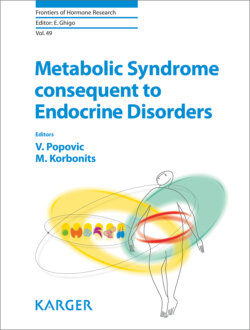Читать книгу Metabolic Syndrome Consequent to Endocrine Disorders - Группа авторов - Страница 11
На сайте Литреса книга снята с продажи.
Hypopituitarism
ОглавлениеHypopituitarism is an uncommon condition with a prevalence of 45 per 100,000. It is characterized by isolated or multiple hormone deficiencies of varying degree, onset, progression, and etiology. Complete or partial deficiency of pituitary hormones is caused by variety of structural lesions or trauma involving the hypothalamus or pituitary gland. Most common cause is a pituitary adenoma and consequences of its treatment by surgery and/or radiotherapy. Other less common causes of hypopituitarism have been recently extensively reviewed [1]. There is a varying sensitivity of the different anterior pituitary hormones to pathological damage. The usual sequential pattern of hormonal deficiencies is the loss of growth hormone (GH) followed by gonadotropins (luteinizing hormone and follicle stimulating hormones), thyreotropin or thyroid stimulating hormone (TSH), and corticotropin (ACTH). Vast majority of patients with hypopituitarism have multiple pituitary hormone deficiencies (MPHDs) usually with more than 2 or 3 axes affected. Hypopituitarism is a dynamic variable throughout follow-up. It may be permanent and progressive with sequential pattern of hormone deficiencies or transient with possible recovery occurring years from the initial event. Longitudinal follow-up, retesting, and adequate replacement are essential.
